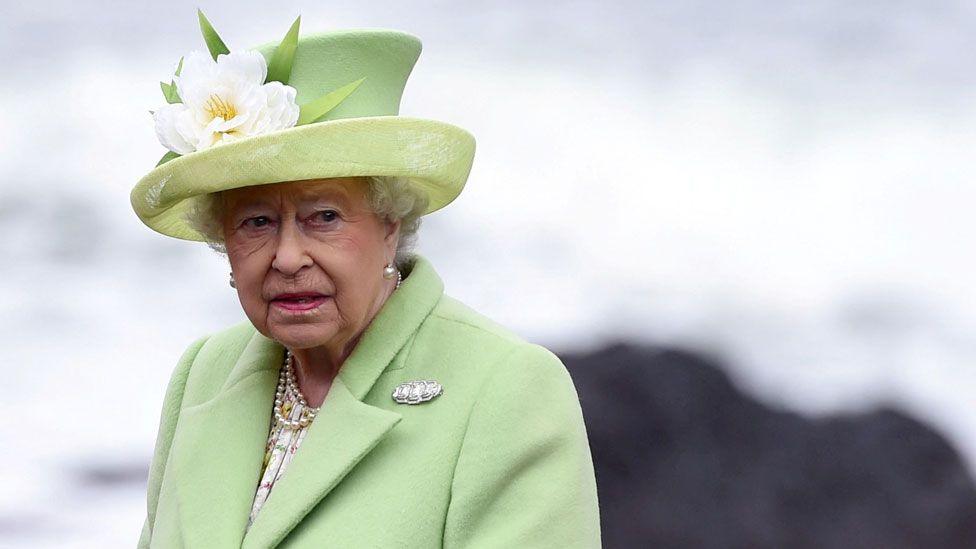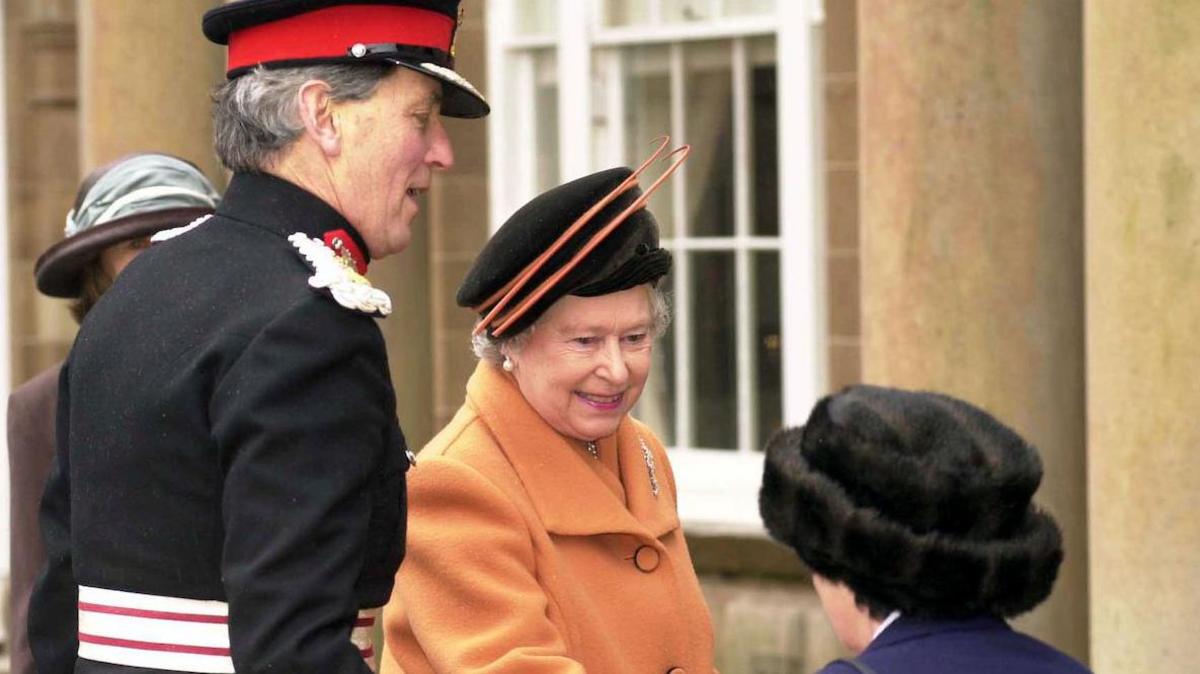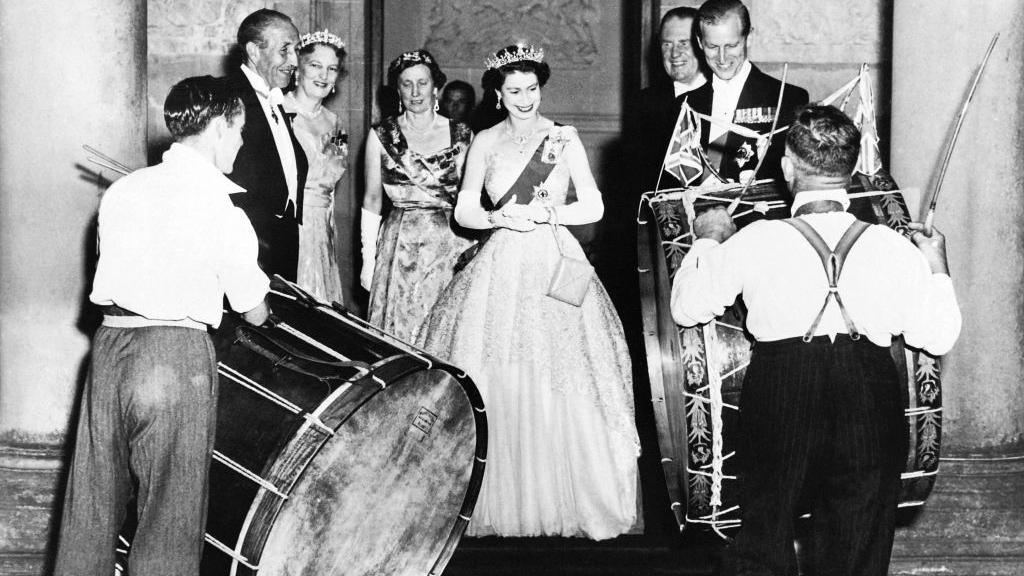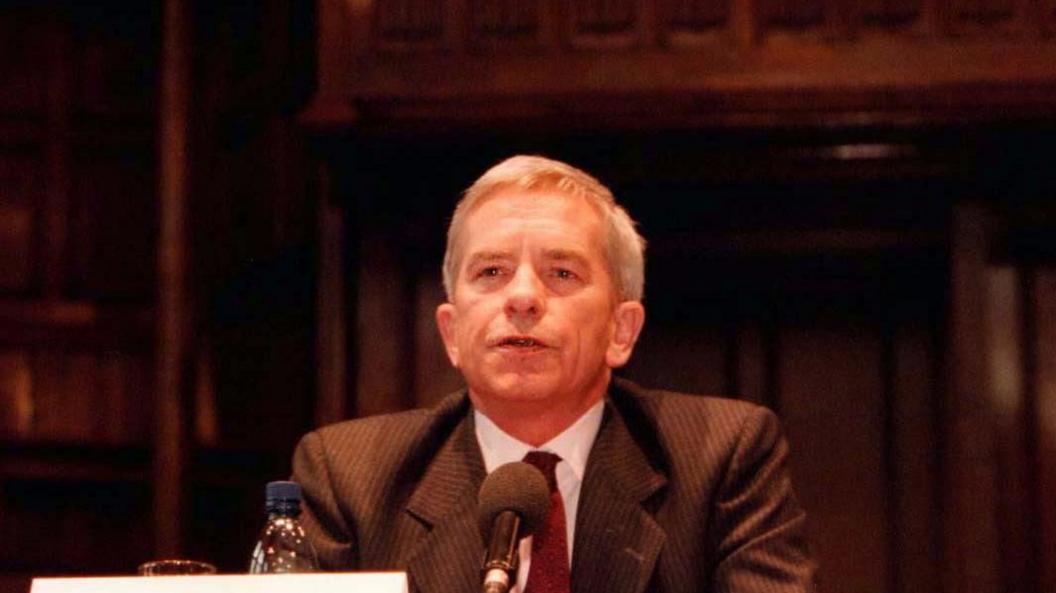Queen Elizabeth II had dim view of Orange marches, state papers claim

- Published
Queen Elizabeth II expressed her relief that Northern Ireland's "silly marching business" was quieter than expected when the then Irish ambassador to the UK visited in 2000, Irish government papers have revealed.
Ted Barrington, who met the late queen at a Buckingham Palace garden party on 25 July that year, said it was not the first time he heard "her dismissive views of the Orange marches".
Almost 25 years later, and after Elizabeth II's death, the report has now been cleared for release by the Department of Foreign Affairs and the National Archives of Ireland.
Mr Barrington said her comments "were similar to those she has made to me on previous occasions".
The ambassador's account is the only available description of what was said.
It was a private conversation and was not recorded.
There is a convention within the UK that one-on-one conversations with the monarch remain private, but that protocol was not followed by the Irish ambassador.
Will not affect 'loyality'
Reacting to what was said in the publication of the Irish state papers, a senior member of the Orange Order described it as a "throw away comment" with no context of the totality of the conversation.
Grand Secretary, the Rev Mervyn Gibson commented that "her late Majesty always acknowledged and thanked the institution for our proclamation of loyalty each year on 12th July".
"Let it be clear, four words from a 'private' conversation with no explanation, quoted by a foreign ambassador and open to interpretation will not diminish the affection the Orange Institution had for her late Majesty, nor will it affect the loyalty we have for the current King," he added.
'Limited circulation'
Mr Barrington said the late queen was "optimistic about the peace process and the future of the [Belfast/Good Friday] Agreement".
Until that point he had held back on reporting those royal views to the Department of Foreign Affairs in Dublin "for fear that they would gain a wider currency".
Conscious of the controversy of the late queen's remarks would likely provoke if publicised, Mr Barrington requested his report of them "be given limited circulation".
Elizabeth II was clearly following developments closely, especially the release that week of paramilitary prisoners under the terms of the 1998 agreement.
Referring specifically to Michael Stone's release on the previous day, she recognised that while he had "done dreadful things", prisoner releases were important for the success of the peace agreement.
The late queen had specifically requested an opportunity to speak to Mr Barrington at the event, which he interpreted as a signal of her interest in visiting the Republic of Ireland.
Royal interest in such a visit had already been mooted the previous year.
At the ceremonial opening of the new Scottish Parliament in July 1999, Prince Charles - as he then was - informed the Ceann Comhairle (Speaker) of the lower house of the Irish parliament - Dáil Éireann - that "Queen Elizabeth looks forward to paying a State visit to Ireland in the near future".

Queen Elizabeth II made 25 visits to Northern Ireland during her 70-year reign
Lambeg drums
The Irish government responded cautiously to these overtures.
In 1999 the then Minister of Foreign Affairs David Andrews thought "such a visit would be welcomed", but it should only happen "at an appropriate time".
By July 2000, the possibility of a visit in the following spring was considered to be "too soon" as the establishment of new political institutions, policing reform and "normalisation" in Northern Ireland would not be sufficiently advanced for such a visit to "proceed smoothly".
It was a decade before the visit finally took place in May 2011.
However, during the late queen's 70 years on the throne, she made 25 visits to Northern Ireland, the majority of them coming in the 1990s and 2000s after the peace process took hold.
During her many speeches and statements about Northern Ireland, she always chose her words carefully.
She made her first visit as monarch in July 1953.
When she stayed overnight at Hillsborough Castle, local Orangemen arrived playing Lambeg drums to mark her coronation.

Elizabeth II was met by Lambeg drummers at the doors of Hillsborough Castle in 1953
The political instability in Northern Ireland which the Irish feared would make a royal visit inopportune emerges clearly from files covering the suspension of devolution in October 2002.
On 4 October the Anglo-Irish Secretariat in Belfast was informed that police had raided Sinn Féin's offices at Stormont and arrested four high-profile party employees, including the head of administration in the party's Stormont Office, Denis Donaldson.
In an explanatory phone call to the Irish minister for foreign affairs, Northern Ireland Secretary John Reid admitted "he was aware of this for some months" and that the police had to take action for reasons he "can't go into".
A "former employee" at the NIO, referred to by the Department of Foreign Affairs as "the NIO messenger", was involved and the raid centred around "official papers of vary[ing] degrees of sensitivity".
Reid was more concerned that the raid covered additional material "from another direction that could be used for targeting", but he was trying to keep this "out of the public domain".
Ten days later Reid suspended devolution and the assembly remained dormant until May 2007.
'Disconcerting signs of imbalance'

The Irish Department of Foreign Affairs was highly critical of Lord Saville's approach to chairing the Bloody Sunday Tribunal hearings
Further documents released from 2002 indicate that officials from the Irish Department of Foreign Affairs were highly critical of Lord Saville's approach to chairing the Bloody Sunday Tribunal hearings.
He and his fellow judges were deemed largely responsible for "the gradual transformation of the inquiry from an "inquisitorial" forum into an adversarial "shooting gallery", an unfortunately undiplomatic analogy in the context of Bloody Sunday.
Of particular concern were the "disconcerting signs of imbalance" shown by Lord Saville in dealing with "establishment" witnesses.
The Irish observers felt he identified a "hierarchy of witnesses" and was "clearly more deferential" to the British police, military and political witnesses.
During the evidence of Gen Sir Frank Kitson, who was in operational charge of the Parachute Regiment on 30 January 1972, Lord Saville intervened to answer questions on Sir Frank's behalf.
At this mid-way point in the inquiry's hearings the Irish diplomats found it difficult "not to conclude that the families may be heading for disappointment".
Such pessimism was not realised when the inquiry's report was eventually published in June 2010, leading to the then Prime Minister David Cameron issuing an apology for the civilian deaths.
From 1999 to 2002 the inquiry made a number of approaches to the DUP leader, the Reverend Ian Paisley, to explain why a planned Democratic Unionist Association counter-protest planned for Derry on 30 January 1972 was called off.
He responded that he had "no personal recollection of the matter".